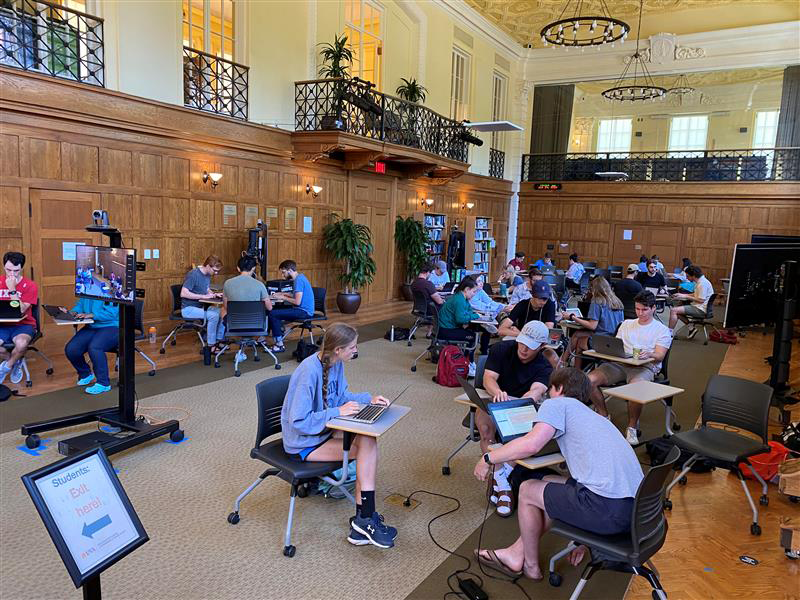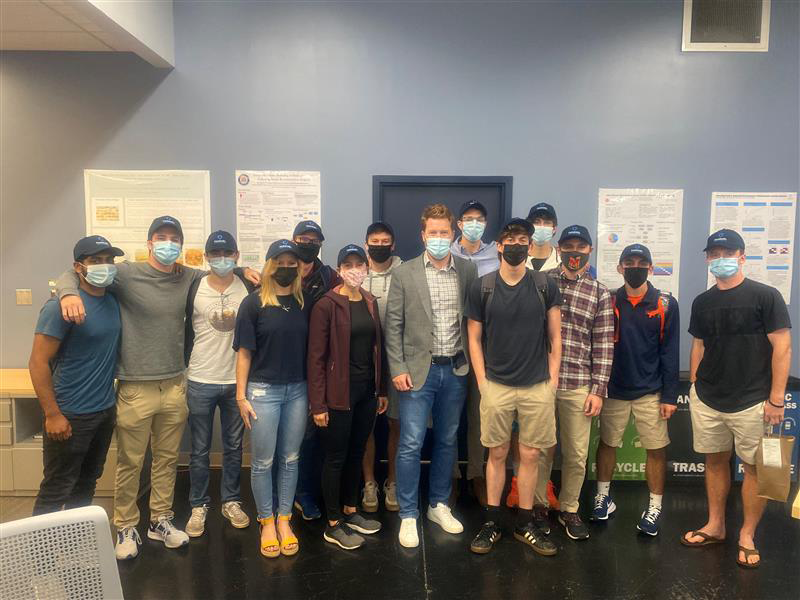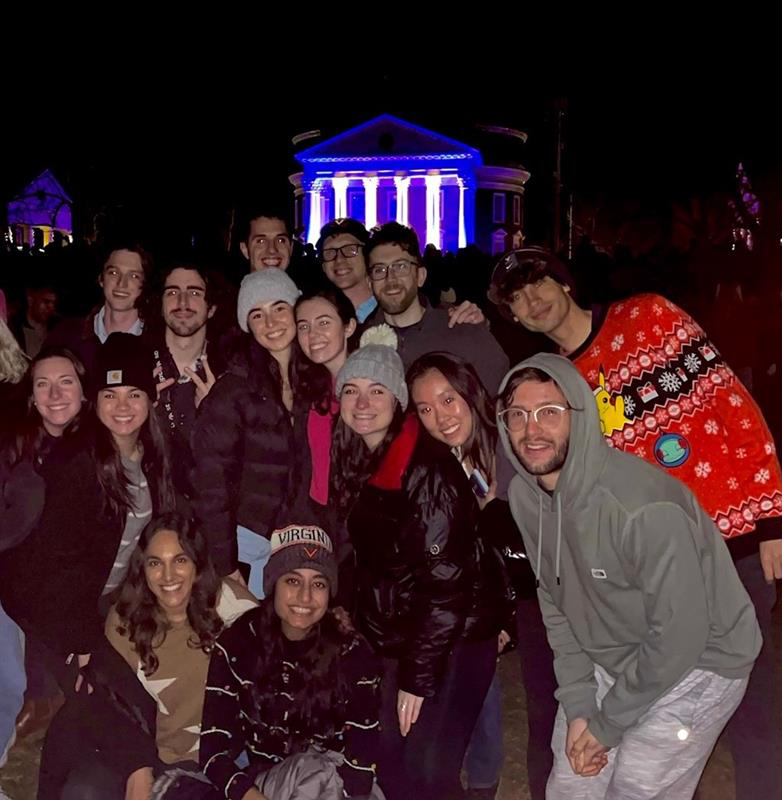Top 10 Reasons To Get a Master's In Data Science From UVA
The University of Virginia’s School of Data Science was the first school of data science in the nation, offering the unprecedented opportunity for students to use data science to quantify and, as a result, transform our world for the better. If that is not reason enough to enroll in their M.S. in Data Science (MSDS) program, then I have ten more for you. The residential one-year master's in data science has many benefits. However, there are a few aspects of the program that I believe stand out from the rest!
1.The Cohort Model
 The residential cohort is a small class in order to maintain a desirable teacher-to-student ratio as well as the program’s high standards of admission. The MSDS Class of 2022 is made up of 53 students, and the year before (MSDS ’21) was the largest cohort with 70 students. Because of the small class size, students get to know everyone in the program. It is great to be able to bond as a cohort – through class, study sessions, and MSDS social events. The other students are more than just your peers, they are also your friends.
The residential cohort is a small class in order to maintain a desirable teacher-to-student ratio as well as the program’s high standards of admission. The MSDS Class of 2022 is made up of 53 students, and the year before (MSDS ’21) was the largest cohort with 70 students. Because of the small class size, students get to know everyone in the program. It is great to be able to bond as a cohort – through class, study sessions, and MSDS social events. The other students are more than just your peers, they are also your friends.
My cohort is made up of a diverse group of people who come from many different fields of study and work experiences. A few came to the program straight out of college, while others are returning to school after working for a few years. There are also those who come from many years in the same industry and are either looking to pivot their careers or tool-up their data science skill set. As a result, everyone brings a different perspective to the classroom, which is invaluable during class discussion and groupwork.
2. The Capstone Project
A key aspect of the MSDS program is the year-long capstone project. Students work in small teams with a company or organization to solve real-world problems. Capstone projects have been sponsored by a variety of companies in the past, including Capital One, NASA, City of Charlottesville, Deloitte Consulting, the Metropolitan Museum of Art, and many more.
At the beginning of the fall semester, sponsors pitch their capstone project topic, and students rank the options. Students typically get one of their top three choices, so everyone gets to work on a project that they are excited about. However, the most important part of the capstone is that students get hands on experience and can apply the data science techniques and tools that they are learning in the classroom to real challenges that impact real people. For example, my capstone project, sponsored by the United Network for Organ Sharing, involves predicting liver utilization rates and post-transplant liver outcomes from text narratives about donor medical and social history. It is a surreal feeling knowing that your capstone work is going to positively impact so many people’s lives.
3. School of Data Science Career Services
The School of Data Science offers many career resources to support students on their career journey. The SDS Career Services team is dedicated to guiding students towards the best career path for them. MSDS students benefit from one-on-one career coaching, in-person and virtual workshops, as well as career fairs and events. A number of SDS alumni also serve on the Industry Advisor Network, which is dedicated to supporting students’ career journeys through one-on-one guidance, panels, and workshops. The IAN is made up of alumni and other industry leaders in various data roles and at a diverse number of organizations, such as Capital One, Amazon, the U.S. Department of State, and more.
4. The School of Data Science Faculty and Administration
Even though the School of Data Science is small, it’s growing rapidly, and the faculty and administration take time to get to know each MSDS student. The faculty who teach in the MSDS program are industry and academic experts in their respective fields, coming from various disciplines like computer science, neuroscience, humanities, business, engineering and, of course, data science. It is also highly apparent how much they care about their students and their success.
Although it is hard to choose, one of my favorite professors from the MSDS program is Professor Michael Porter. Not only is the topic of his course, Statistical Learning, fascinating, but students also get so much out of Professor Porter’s class from the way he teaches, structures his lessons, and takes time for his students.
The faculty and staff are highly involved your success. Administration is great about student engagement, faculty have a lot of office hours for students to come in and ask questions, and there are plenty of opportunities to connect.
5. The Courses
MSDS students are enrolled in 32 credits throughout the one-year program. These include nine required core classes, two electives, and a year-long capstone course. Core classes include Big Data Ethics, Foundational Computer Science, Statistical Learning, Bayesian Machine Learning, and Deep Learning. In the spring term, students have a variety of interdisciplinary electives to choose from, such as Exploratory Text Analytics, Data Visualizations, Big Data Systems, Deep Learning for Visual Recognition, Molecular Data Science, and much more. Professors also give students the ability to apply what they learn through group projects in their classes. This course schedule is designed in such a way that students gain a solid foundation in data science and analytics, while also allowing us to tailor the experience to our personal interests.
6. The Location
The University of Virginia is located in Charlottesville, Virginia, which is a wonderful city to spend a year in as a graduate student. Not only are the University, the City of Charlottesville, and the surrounding areas beautiful year-round, but the location also offers so much to do. Located in the foothills of the Blue Ridge Mountains, Charlottesville is close to major cities like Richmond, VA, and Washington, DC. We’re 30 minutes from downhill skiing and three hours from the beach. Students don’t have to search far for fun day trips or exciting activities. You can read the blog post about popular activities to do in Charlottesville as recommended by students, or check out the School’s favorite places in Charlottesville.
7. The Alumni Network
 The School of Data Science also offers a robust and enthusiastically supportive alumni community. I have found so many alumni are willing to help current MSDS students, whether by guest speaking during a career services event, sharing internship and job opportunities from their employers, or offering career and course advice. I’ve found it easy to connect simply by reaching out on LinkedIn. Students can also leverage more than 250K UVA alumni worldwide through Handshake or UVA networking events.
The School of Data Science also offers a robust and enthusiastically supportive alumni community. I have found so many alumni are willing to help current MSDS students, whether by guest speaking during a career services event, sharing internship and job opportunities from their employers, or offering career and course advice. I’ve found it easy to connect simply by reaching out on LinkedIn. Students can also leverage more than 250K UVA alumni worldwide through Handshake or UVA networking events.
8. New Topics in Data Science
The MSDS program introduces many hot topics and essential problems in data science through courses, conferences, and guest speakers. Beyond their normal classes, students can also sign up for a number of opportunities that the School of Data Science offers throughout the school year.
In the fall, the school hosts Datapalooza, which is an annual conference designed for students, faculty, professionals, and friends of data science to explore different topics in this interdisciplinary field. The School of Data Science hosts the annual Charlottesville Women in Data Science event in the spring, which features outstanding women in the data science industry. Aside from these two flagship events, members of the SDS community are also invited to attend various speaker and seminar series to learn about and gain perspective on data science many subjects. For example, members of the SDS community have heard talks on data science and justice, biocomplexity, data ethics, and much more.
9. A One-Year Program
Perhaps one of the biggest advantages (and challenges) is that this is an intensive program. Students learn hot topics in data science over an 11-month period. The program gives individuals the ability to return to – or enter if you’re a recent graduate – the workforce after just one year with knowledge of essential techniques and skills for career growth. With this program, individuals can gain important skills in data science, while only have investing 11 months of their life as well as much less money than a two-year or longer program.
10. Opportunities Outside of the Classroom
Whether you are looking to apply data science outside of the classroom or just want to engage with the UVA community – there is an opportunity for you. If you are hoping to be more involved with the School of Data Science, you can become a MSDS admission ambassador or run for Student Council. Students can also apply what they are learning in their classes through university jobs or clubs like the Sports Analytics Club or one of the 800+ student-run organizations.

University jobs include working as a teaching assistant for an undergraduate class or interning for the School of Data Science. Students can also get involved in research opportunities like with the School’s innovative collaboratories: interdisciplinary research groups using data science to make advancements in all fields. Students can also work with other UVA departments. For example, three former MSDS students applied their analytical skills by working with the UVA football team, helping the coaching staff make data-informed decisions.
If any one of these reasons sparked your interest, then I definitely recommend looking into applying for the master’s in data science or connecting with a member of our team to learn more.